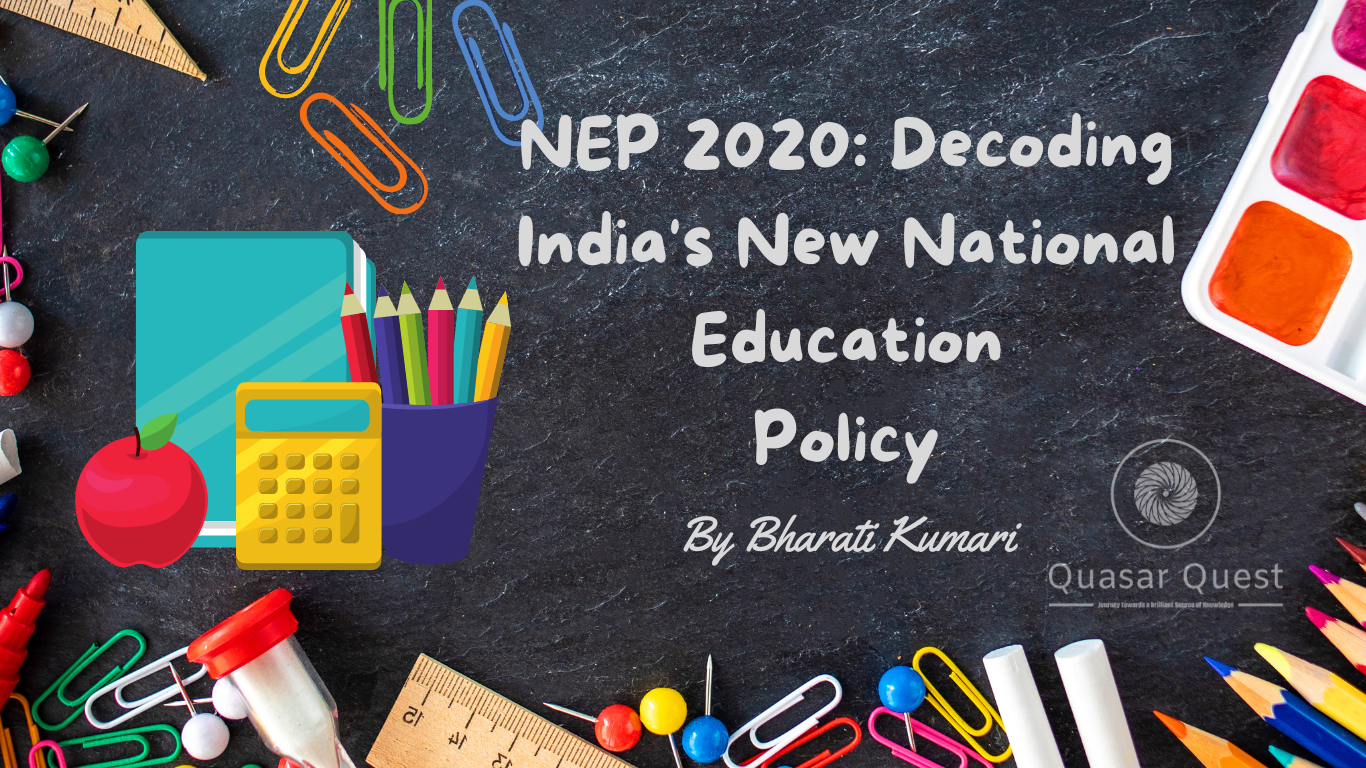
Introduction
The National Education Policy (NEP 2020) is a groundbreaking educational reform initiative introduced by the Government of India to revamp the country’s education system comprehensively.
Vision of NEP 2020
The vision of the National Education Policy 2020 is to create an education system rooted in Indian ethos that contributes to transforming India into an equitable and vibrant knowledge society. It aims to achieve this by:
- Providing high-quality education to all, making India a global knowledge superpower.
- Instilling in students a deep sense of respect towards Fundamental Duties and Constitutional values.
- Developing pride in being Indian and fostering a commitment to responsible citizenship, human rights, sustainable development, and global well-being.
- Reflecting a truly global citizen through knowledge, skills, values, and dispositions that support global engagement and responsibility.
Principles of NEP 2020
- Holistic Development of Students: Emphasizes nurturing every student’s unique capability for holistic development in both academic and non-academic areas. Sensitizes teachers and parents to promote students’ overall growth.
- Foundational Literacy and Numeracy: Gives top priority to ensuring that all students achieve foundational literacy and numeracy by Grade 3.
- Flexibility in Learning: Advocates for flexible learning trajectories and programs, allowing students to choose paths aligned with their talents and interests.
- Integration of Disciplines: Eliminates hierarchies between arts and sciences, curricular and extra-curricular activities, and vocational and academic streams to promote holistic learning.
- Multidisciplinary Education:Promotes a holistic education across various disciplines, including sciences, social sciences, arts, humanities, and sports, to ensure the unity of knowledge.
- Emphasis on Conceptual Understanding:Encourages conceptual understanding over rote learning and exam-oriented education.
- Promotion of Ethics and Values: Instils ethical values and Constitutional principles such as empathy, respect, cleanliness, democratic spirit, and pluralism.
- Multilingualism and Language Power: Promotes multilingualism and recognizes the power of language in teaching and learning.
- Life Skills Development: Focuses on developing life skills like communication, cooperation, teamwork, and resilience.
- Formative Assessment: Emphasizes regular formative assessment for learning rather than summative assessment to discourage the coaching culture.
- Technology Integration: Encourages extensive use of technology to enhance teaching and learning, remove language barriers, and increase access for students with disabilities.
- Respect for Diversity:Upholds respect for diversity and local context in curriculum, pedagogy, and policy formulation.
- Equity and Inclusion: Ensures full equity and inclusion in all educational decisions to enable every student to thrive in the education system.
- Teacher Empowerment: Recognizes teachers and faculty as the heart of the learning process, emphasizing their recruitment, continuous professional development, and positive working environments.
Key Components of NEP 2020:
Universal Access to Quality Education:
-
- Emphasizes equity, inclusion, quality, and innovation across all levels of learning.
- Aims to provide universal access to quality education for all, irrespective of socio-economic background or geographical location.
-
- Redefines the school education system into four distinct stages: Foundational, Preparatory, Middle, and Secondary.
- Promotes holistic development, critical thinking, and experiential learning from the early years of schooling.
Emphasis on Multilingualism:
-
- Advocates for the use of mother tongue as the medium of instruction up to at least grade 5.
- Encourages the learning of other languages to preserve and promote linguistic diversity.
Reforming Higher Education:
-
- Makes higher education more flexible, multidisciplinary, and aligned with the needs of the 21st-century workforce.
- Integrates vocational education and skill development programs into mainstream education to enhance employability and entrepreneurship among students.
Leveraging Technology:
-
-
- Establishes a National Educational Technology Forum (NETF) to facilitate the integration of technology into classrooms.
- Promotes the use of digital resources and innovative pedagogical practices to enhance teaching and learning outcomes.
-
Fundamental reforms in NEP 2020
The National Education Policy (NEP) 2020 seeks to address these challenges by introducing fundamental reforms. The reform emphasizes moving away from rote learning towards fostering genuine understanding and equipping students with 21st-century skills.
Restructured Curriculum Design
- The new curriculum design follows a 5+3+3+4 structure, comprising the Foundational Stage, Preparatory Stage, Middle Stage, and Secondary Stage. The NEP 2020 proposes a revolutionary 5+3+3+4 education system.
- Foundational Stage (5 Years): Focuses on play-based learning for ages 3-8.
- Preparatory Stage (3 Years): Emphasizes language and numeracy skills for ages 8-11.
- Middle Stage (3 Years): Introduces abstract concepts across subjects for ages 11-14.
- Secondary Stage (4 Years): Offers multidisciplinary education and subject choice for ages 14-18.
- Each stage is tailored to address specific developmental milestones, offering flexible, multilevel learning in the Foundational Stage and subject-specific instruction in the Middle and Secondary Stages.
Three Language Mechanism
- Mother tongue or local language as the primary medium of instruction till class 5.
- Continuation of mother tongue till class 8 and beyond is recommended.
- Students will learn three languages, including two Indian languages and one local language.
Amalgamation Of Essential Subjects, Skills, And Capacities
- The curriculum integrates specific subjects, skills, and capacities.
- Emphasis on proficiency in languages, evidence-based thinking, and problem-solving.
- Inclusion of unique subjects like Coding and Computational skills to prepare students for the future.
Assessment and Examination Reforms
The assessment system will shift from summative to formative, competency-based approaches, promoting continuous learning and development.
Regular Formative Tests
- The policy shifts from high-stakes exams to regular formative tests.
- Students can now appear for board exams twice a year, reducing exam pressure.
- National Testing Agency (NTA) will conduct aptitude tests in various subjects.
- Secondary school exams will be redesigned to assess core capacities and reduce reliance on coaching and memorization.
- Regular school examinations will be introduced in Grades 3, 5, and 8 to track progress and improve the schooling system.
Comprehensive Curriculum Framework
- The National Curriculum Framework for School Education (NCFSE) 2020-21 aims to provide a comprehensive curriculum rooted in Indian and local contexts.
- Students will engage in a diverse range of subjects, including vocational crafts, knowledge of India, ethics, and cultural exchange.
- Emphasis will be placed on practical learning experiences, internships, and vocational courses.
Support for Special Talents
The government plans to support gifted students and those with special talents through teacher education programs, project-based clubs, and residential summer programs.
Teacher Encouragement
- NEP 2020 focuses on enhancing teacher competency.
- Merit-based scholarships for 4-year integrated B.Ed. Programs.
- Teacher Eligibility Tests (TET) to include better test material and classroom demonstrations.
- National competitions and Olympiads will be conducted to recognize merit and provide opportunities for further development.
Multilingualism and Cultural Integration
- India aims to promote multilingualism and national unity through a three-language formula for education.
- The medium of instruction will prioritize the home language/mother tongue, supplemented by local and regional languages.
- Efforts will be made to preserve and promote classical languages and literature, alongside the inclusion of foreign languages at the secondary level.
Focus on Holistic Development
The reform places a strong emphasis on cognitive development, character building, and cultivating holistic individuals.
Curriculum content will be streamlined to essential concepts, promoting problem-solving skills and experiential learning approaches such as hands-on activities and storytelling.
Conclusion:
NEP 2020 represents a bold step towards building a future-ready education system that equips learners with the knowledge, skills, and values necessary to thrive in a rapidly changing world. India’s education reform aims to create a dynamic and inclusive learning environment that prepares students for success in an ever-evolving world. By prioritizing holistic development, multilingualism, and practical learning experiences, the nation is laying the groundwork for a brighter future for its youth.
Reference : https://www.education.gov.in/national-education-policy

Pingback: 5 3 3 4 Education System Structure- NEP 2020: Know it All!
It’s crucial to address issues like accessibility and equity to ensure every child has the opportunity to thrive. When discussing access to quality education, initiatives like Day Boarding Schools in JP Nagar, Bangalore, play a pivotal role. By providing holistic education within a supportive environment, these schools contribute significantly to bridging educational gaps and fostering inclusive learning environments. It’s heartening to see efforts being made to make education accessible to all, regardless of socio-economic backgrounds.
Indeed, good initiative by the government. Thank you! for the comments. However, as an author and website owner I do not endorse the school as named in your comments.
The National Education Policy (NEP 2020) indeed marks a significant milestone in India’s educational landscape, aiming to bring about holistic transformation across all levels of learning. It’s commendable to see the government’s commitment to revamping the education system comprehensively. As we navigate through these changes, it becomes crucial for parents and educators to ensure that students receive the best possible education.
Indeed, good initiative by the government. Thank you! for the comments. However, as an author and website owner i need to clarify that I have not endorsed the named school.